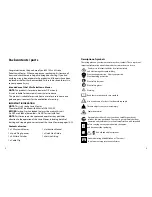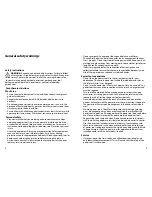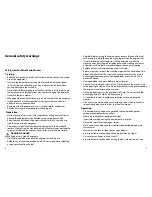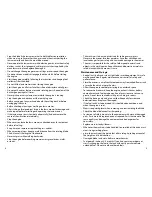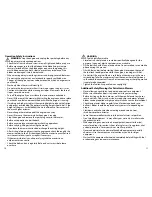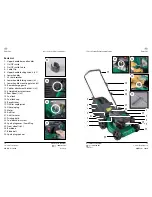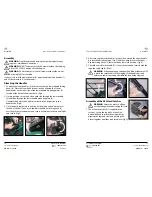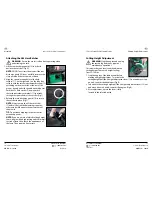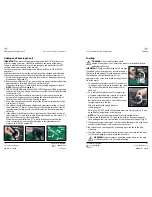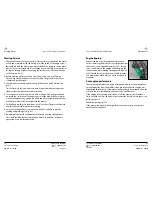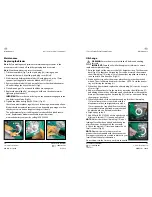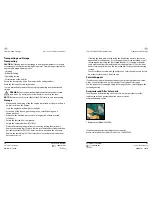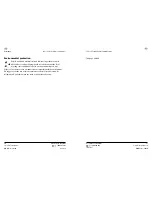
• Stop the blade if the lawn mower has to be tilted for transportation
when crossing surfaces other than grass, and when transporting the
lawn mower to and from the area to be mowed.
• Never operate the lawn mower with defective guards, or without safety
devices, such as the stoneguard and/or grass-catcher, supplied by the
manufacturer in place. Replace if damaged.
• Do not change the engine governor settings or over speed the engine.
• On power-driven models, disengage the drive clutch before starting
the engine.
• Start the engine carefully, following the instructions and keeping feet
well away from the blade.
• Do not tilt the lawn mower when starting the engine.
Start the engine on a flat surface that is free of obstacles and tall grass.
• Do not put hands or feet near or under rotating parts. Keep clear of the
discharge opening at all times.
• Never pick up or carry a lawn mower while the engine is running.
• Stop the engine and disconnect the spark plug wire:
– Before carrying out any work underneath the cutting deck or before
unclogging the chute;
– Before checking, cleaning or working on lawn mower;
– After striking a foreign object. Inspect the lawn mower for damage and
make repairs before restarting and operating the lawn mower;
– If the lawn mower starts to vibrate abnormally (find and remove the
cause of the vibration immediately).
• Stop the engine:
– Whenever you leave the lawn mower unattended even for a moment.
– Before refuelling.
– Every time you remove or replace the grass-catcher.
• When mowing, always keep to a safe distance from the rotating blade.
This distance is the length of the handle.
• Never cut grass while walking backwards.
• Stop the engine before pushing mower across gravel drives, walks
or roads.
• This machine is to be used exclusively for cutting natural grass.
Never use the mower for other purposes. Any other utilization can
involve danger for your safety and can involve damage to the mower.
• The user is responsible for the safety of other people, animals and
objects in the working area. Keep children and domestic animals at a
safe distance while the mower is in use.
Maintenance and Storage
• Keep all nuts, bolts and screws tight to be sure the equipment is in safe
working condition. Regular maintenance is essential for safety and
performance.
• Store the mower in a well ventilated room away from naked flames such
as may be found in hot water heaters.
• Allow the engine to cool before storing in an enclosed space.
• To reduce the fire hazard, keep the engine, exhaust silencer, battery
compartment and fuel storage area free of grass, leaves, or excessive
grease. Do not leave containers with grass cuttings in rooms.
• Check the stone-guard and grass-catcher frequently for wear and
deterioration and replace if damaged.
• If the fuel tank has to be drained, this should be done outdoors and
when the engine is cool.
• Wear strong work gloves when removing and reassembling the blade.
• Check the blade’s balance after sharpening.
• For reasons of safety, do not use the equipment with worn or damaged
parts. Parts are to be replaced and not repaired. Parts that are not of the
same quality can damage the equipment and be dangerous for
your safety.
• Replace worn or faulty silencers.
• Whenever the machine is to be handled, transported or tilted you must:
– wear strong working gloves;
– grasp the machine at the points that offer a safe grip, taking account of
the weight and its distribution.
• Damaged blades and worn bolts are major hazards.
• Fuel goes off in about 3 - 4 months. If you find your mower does not
start, try changing the fuel in the tank with newly purchased fresh
unleaded fuel. Do not use ethanol based fuels.
8
9



